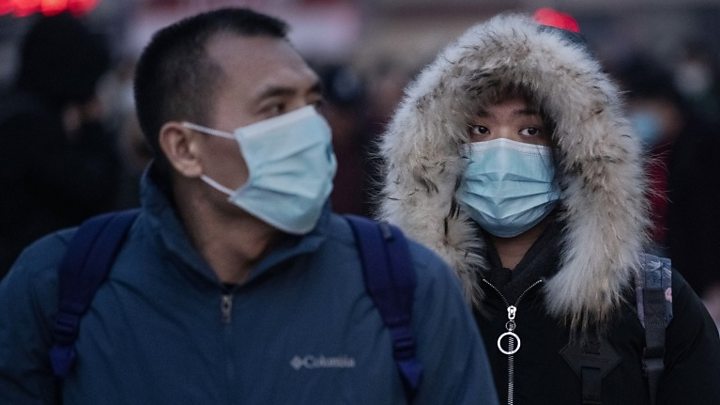A Chinese doctor who tried to issue the first warnings about the deadly coronavirus outbreak has died, the hospital treating him has said.
Li Wenliang contracted the virus while working at Wuhan Central Hospital.
He had sent out a warning to fellow medics on 30 December but police told him to stop "making false comments".
There had been contradictory reports about his death, but the People's Daily now says he died at 02:58 on Friday (18:58 GMT Thursday).
The virus has killed more than 560 people and infected 28,000 in China.
It causes severe acute respiratory infection and symptoms usually start with a fever, followed by a dry cough. Most people infected are likely to fully recover - just as they would from a flu.
How was the death reported?
Global Times, People's Daily and other Chinese media had reported Dr Li's death earlier on Thursday.
Dr Li, 34, was initially declared dead at 21:30 local time and the news triggered a huge wave of popular reaction on Weibo, China's equivalent of Twitter.
The People's Daily sent out a tweet saying Dr Li's death had sparked "national grief".
However, Global Times then said he had been given a treatment known as ECMO (extra-corporeal membrane oxygenation) which keeps a person's heart pumping and keeps their blood oxygenated without it going through their lungs.
Global Times said he was in a critical condition.
Journalists and doctors at the scene, who do not want their names used, told the BBC and other media that government officials had intervened.
Official media outlets had been told to change their reports to say the doctor was still being treated.
The media outlets then later reported the new time of Dr Li's death:
Most of those killed by coronavirus have been over the age of 60 or have suffered from other medical conditions, according to China's health authorities. Dr Li's medical history is not known.
What is Li Wenliang's story?
Dr Li, an ophthalmologist, posted his story on Weibo from a hospital bed a month after sending out his initial warning.
He had noticed seven cases of a virus that he thought looked like Sars - the virus that led to a global epidemic in 2003.
On 30 December he sent a message to fellow doctors in a chat group warning them to wear protective clothing to avoid infection.
Four days later he was summoned to the Public Security Bureau where he was told to sign a letter. In the letter he was accused of "making false comments" that had "severely disturbed the social order".
He was one of eight people who police said were being investigated for "spreading rumours" Local authorities later apologised to Dr Li.
In his Weibo post he describes how on 10 January he started coughing, the next day he had a fever and two days later he was in hospital. He was diagnosed with the coronavirus on 30 January.
What is the latest on the virus in China?
China is introducing more restrictive measures to try to control the outbreak.
Beijing has banned group dining for events such as birthdays and weddings while cities such as Hangzhou and Nanchang are limiting how many family members can leave home each day.
Hubei province, the worst hit by the virus, has switched off lifts in high-rise buildings to discourage residents from going outside.
Its capital, Wuhan, has a lack of beds and equipment, one senior city official said. Despite the rapid construction of two hospitals, the volume of patients is causing severe strain.
Reports on social media say the Wuhan government is to carry out door-to-door temperature checks on residents.

Media playback is unsupported on your device
The city of Dali in Yunnan province was accused of requisitioning a shipment of masks bound for Chongqing. Dali's government said it could not do anything as the boxes had already been distributed.
The cities of Qingdao and Shenyang also reportedly squabbled over a medical shipment.
There has been criticism of the crackdowns, with Human Rights Watch saying China was "treating public health with a sledgehammer".
Meanwhile, Hong Kong has seen panic buying of goods, including toilet rolls, and there have been huge queues for masks.
What's the latest on infections?
Although the virus has spread overseas, with confirmed infection in some 25 nations, there have so far been only two deaths outside mainland China - one in Hong Kong and one in the Philippines.

Media playback is unsupported on your device
The World Health Organization has declared a global health emergency, saying if funds are not allocated now to tackle the outbreak, nations would pay for it later.
Although the official figures in China are of 28,000 infections, some scientists have estimated that the actual rate could be 10 times higher, with the majority of infected people only presenting mild symptoms, not receiving treatment, yet passing on the potentially deadly disease.
The UK on Thursday confirmed a third case of the virus.
Some 3,700 people on the Diamond Princess cruise vessel moored off Japan face testing and quarantine for at least two weeks. It has seen on 20 virus cases.
Another cruise ship with 3,600 passengers and crew is quarantined in Hong Kong with three cases on board.
Learn more about the new virus
Have you been affected by any of the issues raised? You can share your experiences by emailing haveyoursay@bbc.co.uk.
Please include a contact number if you are willing to speak to a BBC journalist. You can also contact us in the following ways:
2020-02-06 20:46:40Z
Bagikan Berita Ini















0 Response to "Coronavirus kills Chinese whistleblower doctor - BBC News"
Post a Comment